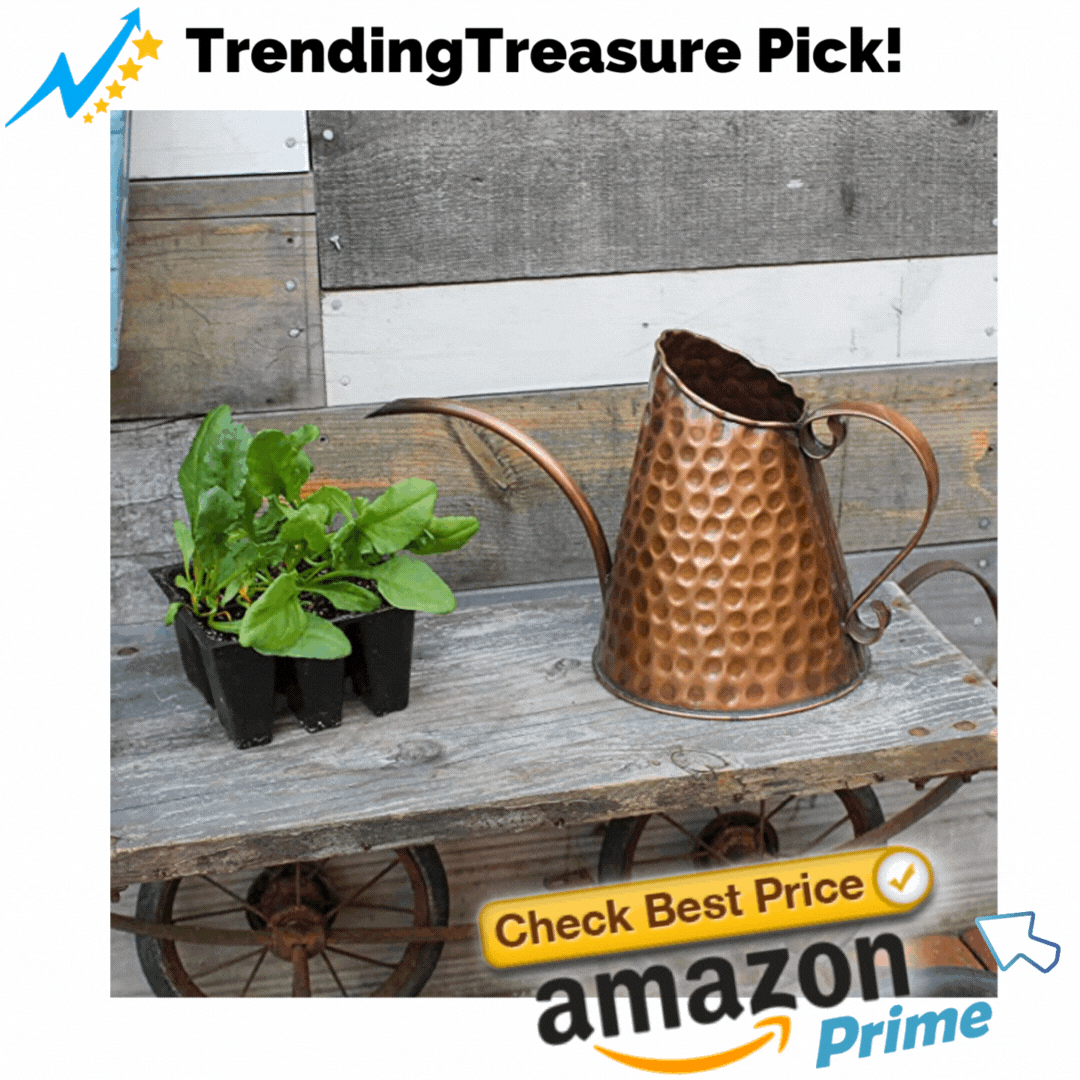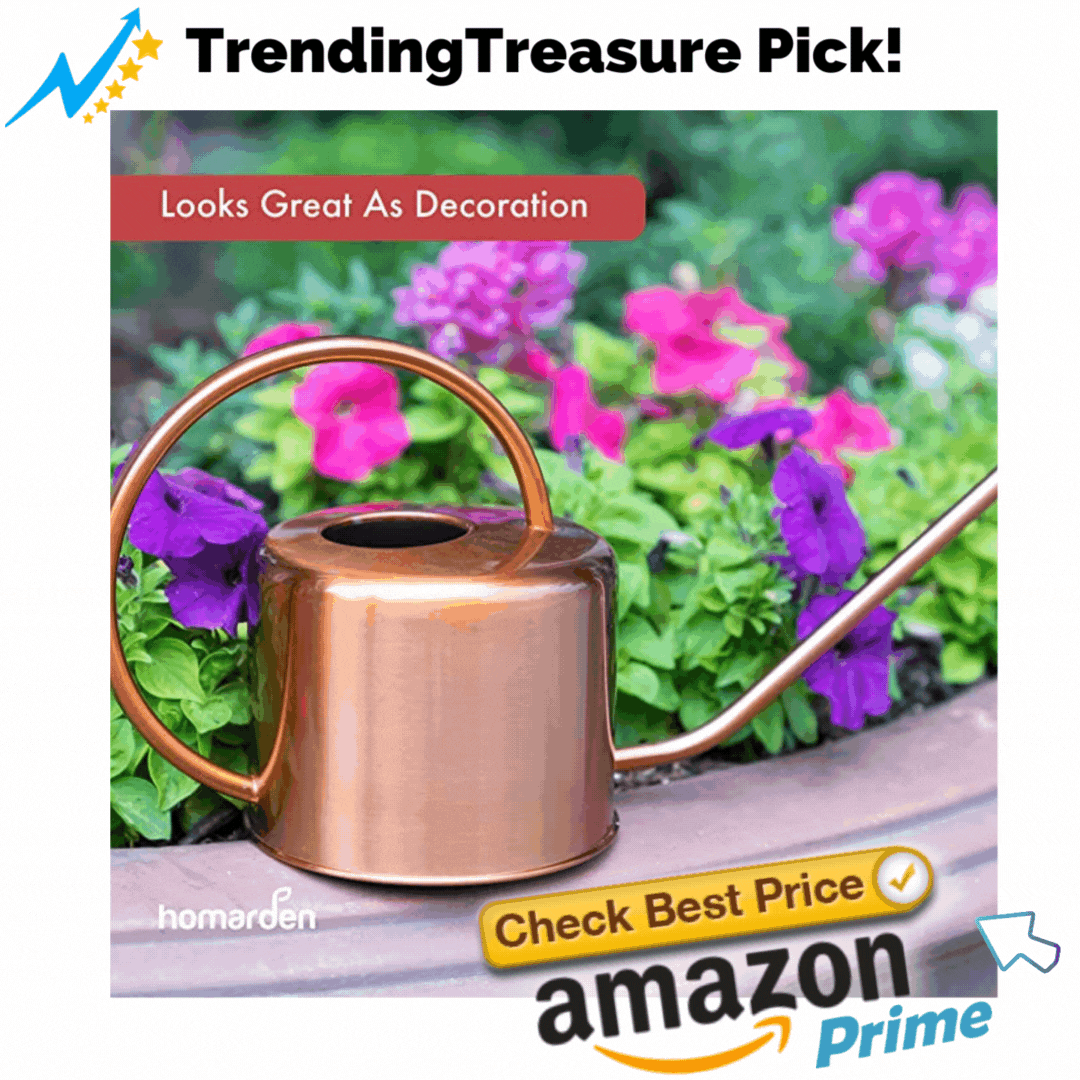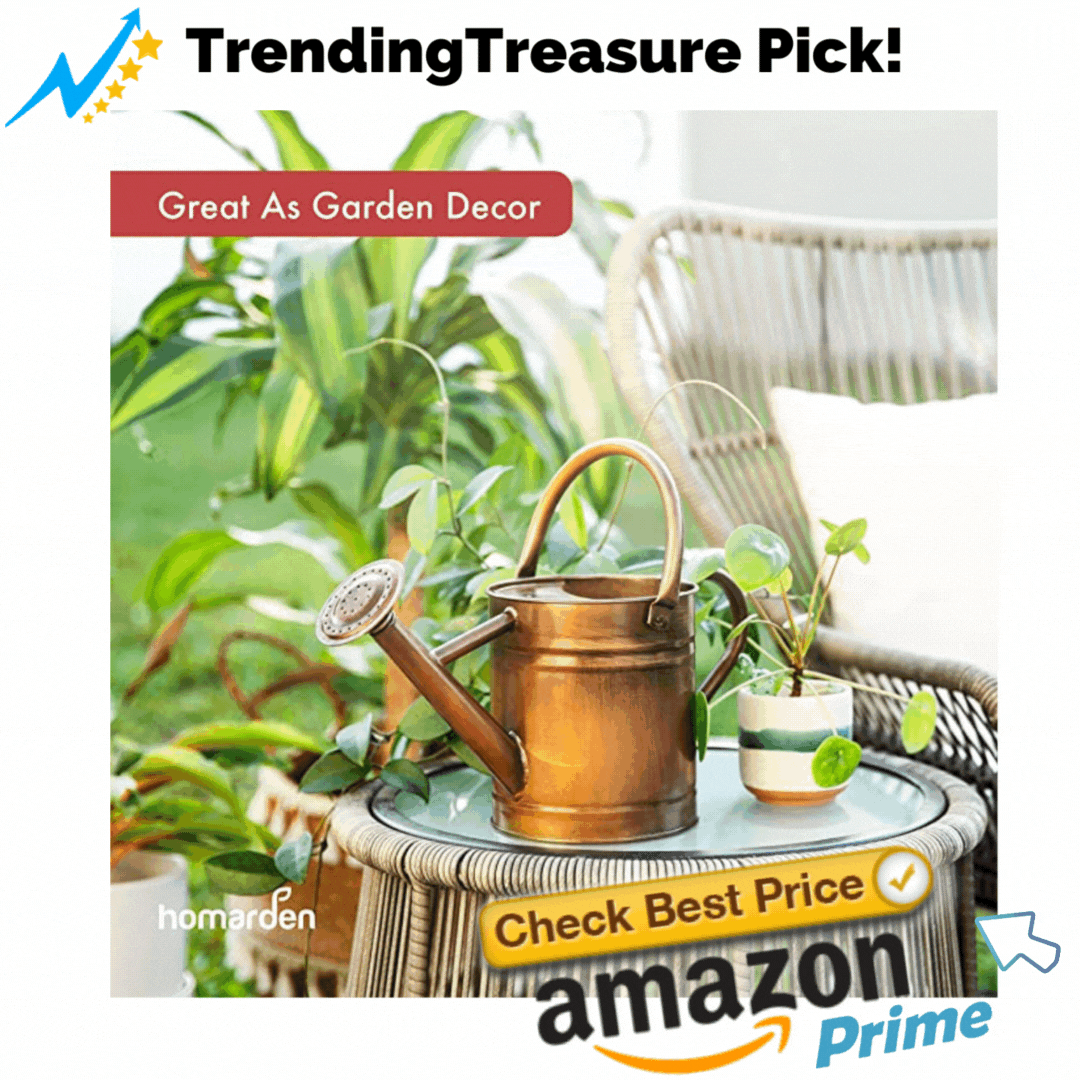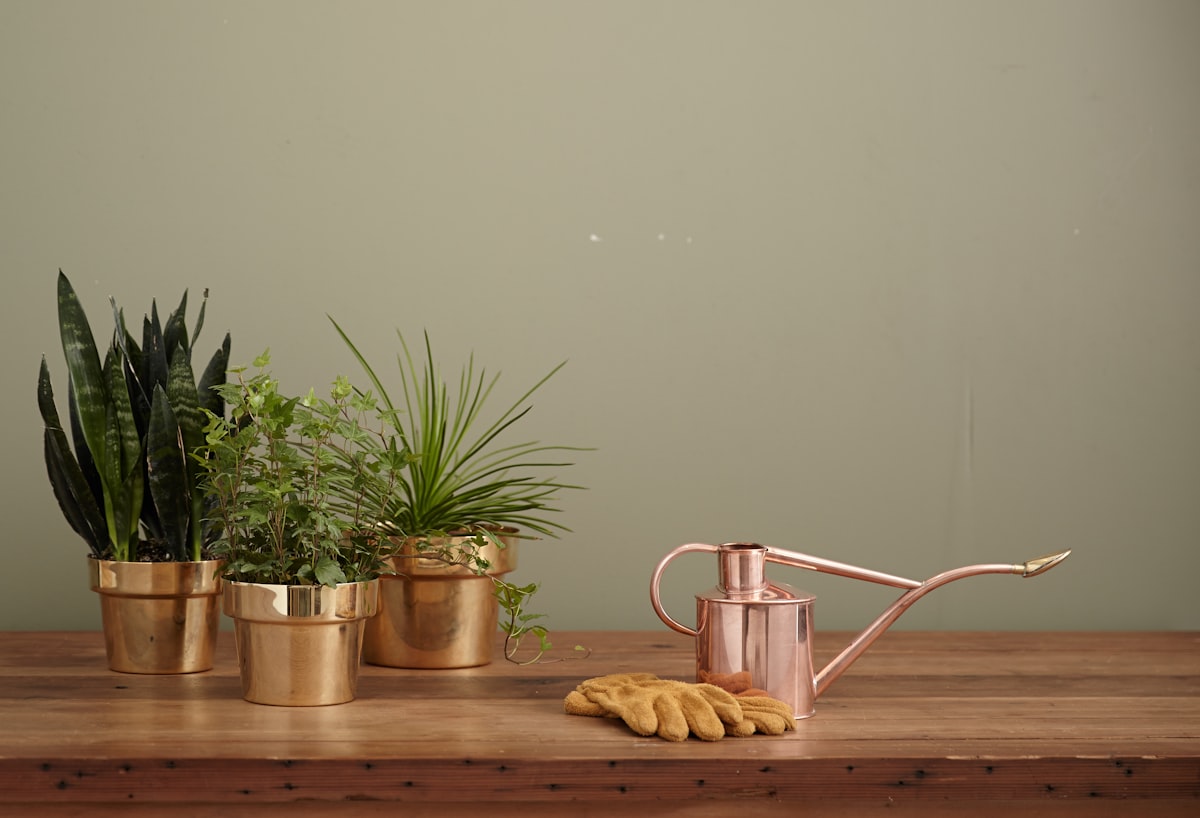The best copper watering cans are a great way to give your garden that stylish touch – and they also act as a great tool for watering your plants.
Copper becomes naturally non-corrosive, so it's ideal for use with water. Not only does it look stylish in the garden or on patio, but its antimicrobial properties make it very hygienic too. The best copper watering cans will have brass fittings and spouts to stop rusting, but you may still want to treat them with a good copper polish every now and then.
The capacity of the best copper watering cans varies from one model to the next. You'll need one that is big enough to deal with all your outdoor plants but not too large that you can't handle it comfortably when you're carrying it around your garden. Some also have self-pour spouts so you don't have to get close to pour out water – this is especially useful if you've got arthritis or another condition that makes pouring out water difficult.
If you're looking for something more decorative than just a basic plastic jug, check out our guide to the best copper watering cans.
How We Choose
We've reviewed the best copper watering cans to help you find the perfect tool for your gardening needs. Whether you're looking for a stylish container to use for decorative purposes or a functional can that will make it easier to water your plants, we have a great option for you below.
Dainty Copper Watering Can

The Minuteman International Dainty Watering Can is another small, functional watering can that's ideal for indoor use. It measures 7-1/2 inches in height and 12-inches in length with a 6-inch diameter, making it perfect to pop on a shelf or desk even if you have limited space.
The copper material is hammered and will develop an attractive patina over time, while the long spout reaches beneath leaves to deliver water directly to the soil without making a splashy mess. Achieva's claim this as the 'world's most beautiful watering can', but you should note that it does cost over double the price of other options on this list.
You get three pints of water in each pour which is plenty for smaller pots or plants – though you may need to refill more frequently if using it outdoors as an alternative to a hosepipe. You could even consider using it as a decorative item instead of your traditional watering can - especially since its striking design makes it look like something out of an antique shop window rather than your average watering can.
Homarden Copper Watering Can

The Retron watering can is a stylish, functional and efficient gardening tool that's also good for kids to use. It's made from copper, which means it has a gorgeous finish, and its long spout makes it ideal for watering hanging baskets and other small pots.
The refill hole on the side of the water can makes filling up quick and easy, plus you get a decent 1.2-liter capacity so you won't run out of water very quickly. The only real downside is that this watering can doesn't come with any mini versions - though they are available separately if needed - but otherwise this is an excellent option for anyone looking for a copper-clad watering can in 2019.
Homarden 1 Gallon Copper Colored Watering Can

The key to indoor gardening is effortless plant watering, and there’s no better way to achieve this than with a copper watering can. Copper is highly durable, rust-resistant, and looks great too. Not only will it make your indoor garden look more attractive and inviting, but it will also help keep your plants healthy by allowing you to easily water them without having to worry about overwatering or underwatering.
The ergonomic design of this copper watering can makes it comfortable to hold, allowing you to keep your hands dry while you water your indoor plants or outdoor garden with ease. The removable spout also allows you to control the water flow, so that you don't end up over-watering your plants or flooding your lawn. The two handles make it effortless to transport from one place to another, whether its from inside the house outside or vice versa.
For those who appreciate function as well as beauty, this copper watering can is an ideal choice.
Copper Watering Can FAQs
It's not hard to find the best copper watering can for your home, but with all of the different products out there, it can be tough to know which one is right for you.
The last thing you want is to end up with the wrong product and have to return or exchange it. With this in mind, we've created a list of the most Frequently Asked Questions about copper watering cans so that you can make an informed choice when buying one for your home. With this information, you'll be able to confidently choose the best copper watering can for your needs.
Is Copper Good For Watering Cans?
While copper is very effective at transferring heat, it's not so great at retaining it. This means that when you use a copper watering can to water your plants, the water will cool off quickly once it hits the soil. While this may be fine for plants that need plenty of water on a hot day, over time this can lead to root rot and underwatering in plants that prefer drier soil. If you don't want to constantly fill up your watering can, we recommend getting an impact sprinkler instead.
While copper does have some drawbacks as far as watering cans go, there are also plenty of benefits. First off, compared with steel and plastic cans, copper ones tend to cost less – sometimes significantly so. They're also usually pretty lightweight compared with other materials too. The best part about using a copper watering can though is how beautiful they look when filled with water and basking in the sun!
How Long Do You Keep Copper Water?
While the shelf life of copper water depends on the specific product you choose, generally speaking, you can expect a copper water pitcher to last up to six months.
If your copper water is exposed to extreme temperatures or direct sunlight, it will lose its effectiveness faster. Copper water should be stored in a cool and dark place away from sources of heat.
What Plants Are Sensitive To Copper?
Copper can be deadly to some plants and have no effect on others. The best way to find out if a plant is sensitive to copper is usually by trial and error, unless you consult a reference book or the package of the fertilizer you're using.
Plants that are sensitive to copper include azaleas, blueberries, camellias, chrysanthemums, holly, rhododendrons and boxwood. If you notice any yellowing of leaves or stunted growth with these types of plants after adding copper sulfate fertilizer, stop using it immediately as it could kill your plants.
Does Copper Liquid Destroy Plants?
For the most part, copper isn't a great choice for killing plants because it can change their color and other properties. However, there are some instances where this would be beneficial. For example, it may be necessary to kill off certain invasive species in your garden if you want to plant something new there. Another instance when you might use copper is if you're restoring an old home or building that needs restoration work done on its roof.
It's important to note that the solution should only be applied directly to the roots of these types of plants – never on leaves or stems – and only after doing research so you know exactly how much copper will affect your plants' appearance without harming them.
What Is The Best Material For A Watering Can?
Depending on the kind of plants you have, you might need to water them more or less often. For really thirsty plants like succulents, you might even want to invest in a self-watering pot to keep your plant happy when it's not getting regular attention from you (or a gardener).
Some watering cans are made from tough materials that can stand up to rust and damage from rough handling. Metal pots with plastic lining are hardy enough for most needs, but if yours breaks, most hardware stores will swap out parts for free.
Other options include durable plastics such as polypropylene or high-density polyethylene (though these may be less easy to fill), as well as recycled rubber and 100% recycled plastic pots. Most watering cans are made of thermoplastic elastomer (TPE), which is flexible enough so the opening won't crack when pressure is applied.
Is A Plastic Or Metal Watering Can Better?
It's a common misconception that plastic cans are more affordable than metal, but in reality, it depends on the type of can you buy. If you're looking for a high-end metal can that will last years and years, then you're better off going with a traditional steel option as these tend to cost around $30-$60 online.
Plastic options are usually much cheaper at under $20; however they don't generally last as long or feel as sturdy compared to metal models. It's worth noting that PVC plastic is not recommended because it contains Bisphenol A (BPA), which is an ingredient linked to health concerns.
What Is The Symptoms Of Copper Deficiency In Plants?
Copper deficiency in plants can affect the way that they grow and the quality of their fruit or flowers. You may notice one or more of the following symptoms:
Slow growth – copper is involved in many aspects of plant growth, including flowering and fruiting; so a lack of it will severely slow down your plant's progress.
Weak stems – as well as growing slowly, your plants may also have weak stems because copper is involved in producing cellulose. This gives them the strength to stand upright and support themselves. If there isn't enough copper within the plant, its stem will be weak and it could easily snap off if it receives too much wind or snow for example.
Most gardeners choose to grow their vegetables on stakes anyway because they're smaller-growing than other varieties; so this symptom isn't usually a problem unless you have particularly heavy crops on your hands!
Do Tomatoes Like Copper? ?
Copper is poisonous to plants in large concentrations, so copper pots are generally not recommended for plant use. However, tomatoes actually prefer a little bit of copper in their soil; too much or too little can cause problems with fruit production. A tomato's response to copper depends on the type of soil it grows in. Tomato plants growing in standard potting soil have moderate tolerance for copper and benefit from having small amounts present in the soil. The same tomato plant growing in vertisoil (a type of mineral-based compost) has low tolerance for copper and suffers damage if exposed to high levels.
Tomato plants that show signs of sensitivity to copper include “Beefsteak,” “Ripe Pink,” “Celebrity,” “Lillian's Yellow Heirloom Blend,” and “Beeline.” Tomatoes that tolerate or thrive with a small amount of copper include “Better Boy,” “Black Cherry,” and “Sungold.” For more information about how much copper is best for your tomato plants, consult with your local garden supplier or extension agent.
Is Brass Good As A Watering Can?
Brass isn't a great choice for a water can, but it's better than plastic. Brass has a much higher copper content than other brass alloys, so it won't leach as much into the soil. However, brass is softer and more prone to denting when compared to steel or iron. You'll also want to choose a style that has at least an oversize spout so you can deliver water with minimal dribbling and running off the top of your plant. Good options in our review include the Royal Dutch Crate & Barrel Water Bird, which has an easy-to-fill wide opening; the Greenes Pot Planter with its unique self-watering design; and the Johnston & Peters Antique Brass Water Can which scored well in user reviews because of its solid construction. If you have access to a welder, it would be worth upgrading from brass even if your current watering can is still in good shape by replacing vulnerable parts like rivets with bolts or screws (which are harder for squirrels to get their paws around). Avoid stainless steel cans because they're hard on your plants' roots due to salt buildup from tap water deposits as well as being quite heavy when filled with water.
What Are The Disadvantages Of Hand Watering?
There are a few disadvantages to hand watering. First, it takes time and effort. Second, you have to do it every day, rain or shine. Third, you can only water parts of your garden at any one time. Fourth, if the water pressure isn't high enough or your nozzle isn't the right size for your hose pipe (check the label), you'll waste a lot of water by spraying too far or not getting a good seal on the spout.
Finally, hand watering is hard on your back unless you use a wheeled spreader as well as a lightweight hose reel like this one from Amazon .
Conclusion
The best copper watering can is one that is durable, reliable, and comfortable to use. Look for features such as a sturdy construction, a leak-proof design, and an ergonomic handle for more precise control when watering plants or other areas around the yard. Additionally, choose a model that comes in various sizes and styles so you can find one that suits your preferences perfectly. With these criteria in mind, any gardener will be able to select the ideal copper watering can without having to compromise on quality or performance.









